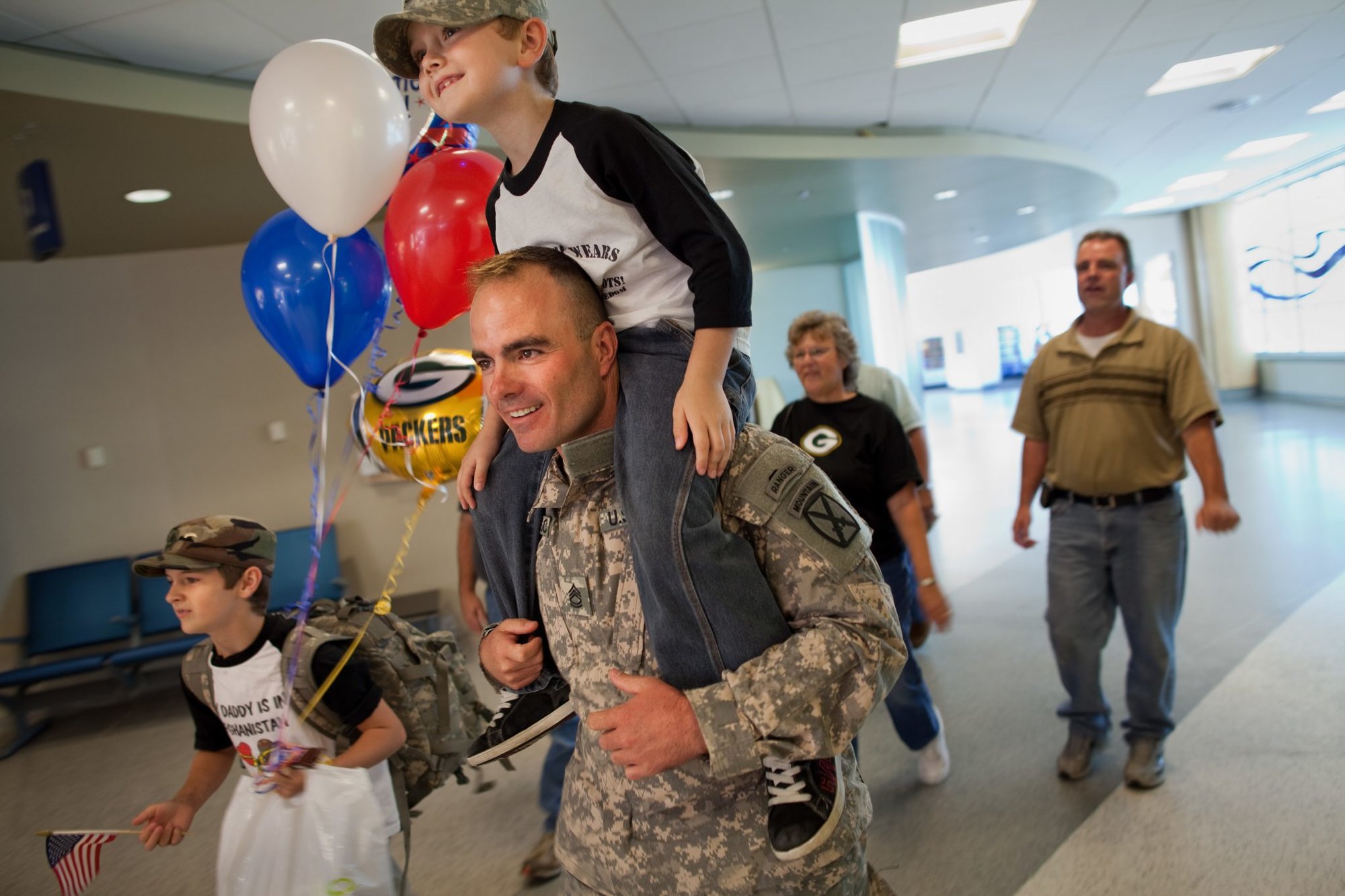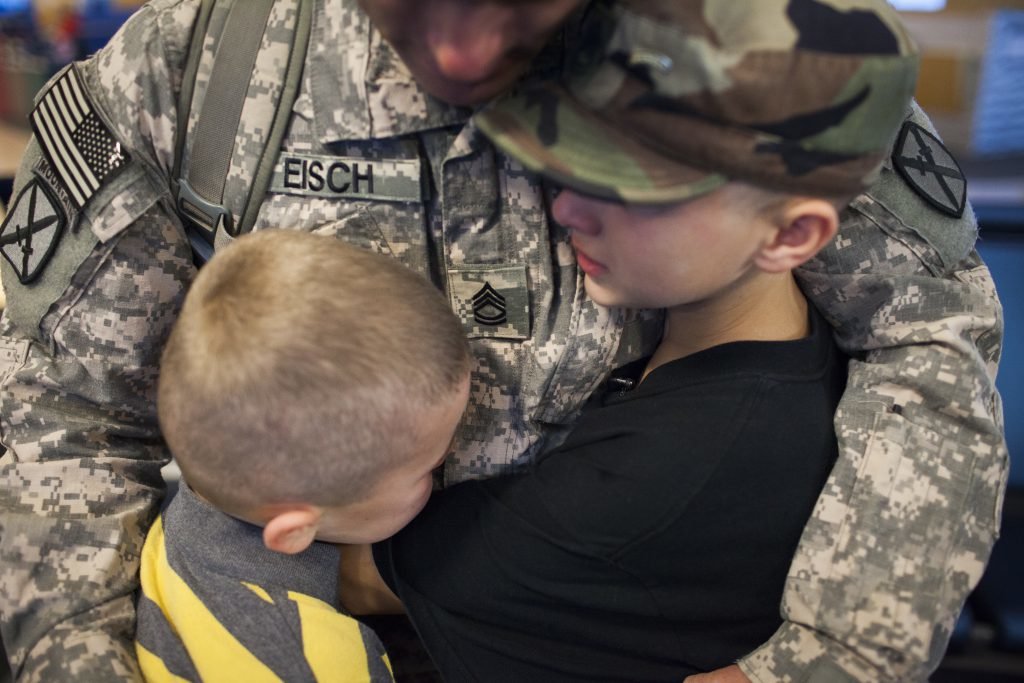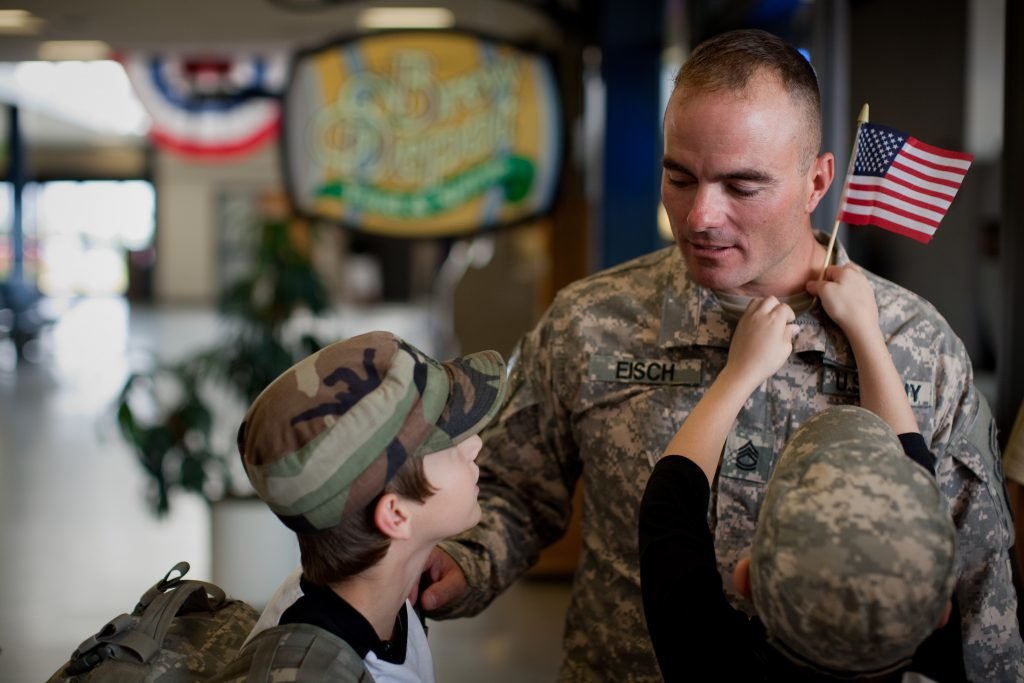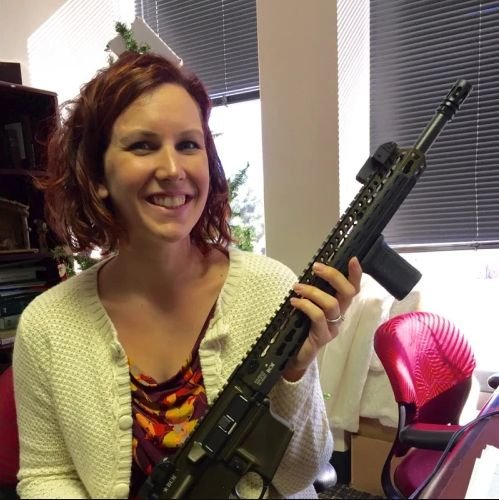Documentary ‘Father Soldier Son’ Focuses on Impact of Service on Family

Father Soldier Son. Isaac, left, and Joey Eisch with their father, Sgt. First Class Brian Eisch, on his return from Afghanistan from leave. Cr. Marcus Yam/New York Times/Netflix 2020
Premiering Friday on Netflix, “Father Soldier Son” tells the story of platoon sergeant and single dad Sergeant First Class Brian Eisch, who served with the U.S. Army’s 10th Mountain division out of Fort Drum, New York. Filmed over a period of nine years, starting with Eisch’s year-long deployment to Afghanistan in 2010, the documentary focuses on the impact military service has on family — in this case, Eisch’s two sons: Isaac, 12, and Joey, 7.
From moving hundreds of miles from their home to stay with their uncle in Wisconsin while their dad was deployed to handling the changing familial dynamics when Eische is wounded in combat, the boys deal with complicated situations unique to the military lifestyle.
Leslye Davis and Catrin Einhorn, the New York Times journalists who directed and produced the film, were drawn to the idea of showing a new perspective on military service. They capture a raw and emotional look at the struggles and achievements of one American family in the wake of war, trauma, and growing up.
Coffee or Die recently spoke with Davis and Einhorn about the making of the film and what they hope it will achieve. This interview has been edited for length and clarity.

COD: What stood out about Brian Eisch in particular that made you want to pursue his story for “Father Soldier Son”?
CE: So back in 2010, when President Obama was doing the troop surge to Afghanistan, there was a team of us at the New York Times that wanted to figure out a way to really — you know, it was a huge news story, but we felt like the public was kind of fatigued by reading about the war. We weren’t getting a lot of engagement on stories about the war in Afghanistan. And so we set out to follow a battalion over their year-long deployment. There were many soldiers that we followed over that year, and Brian Eisch was one of them.
We did that series for over a year, and that ended. But there were all these developments that continued to happen in Brian’s life, and his boys were so captivating, we were just so taken by the boys and how they could reflect on their dad’s experiences that we followed up. We went back and we kept documenting his family.
COD: Was there a specific theme that you wanted to explore with this?
LD: Yeah, so with this film, we really wanted to explore the impact of Brian’s service on his kids. And Joey and Issac were particularly articulate for little boys. They seemed to really have the ability to get in touch with what they were feeling and put that into words. And so in Joey’s case, when he was a kid, it was actually quite a lot of anger. And then in Isaac’s case, it was this feeling of pride and needing to step up. And certainly both boys internalized this sense of needing to live up to their father — in their eyes, he was a hero.
COD: In filming a documentary, especially when you’re filming a family’s life as it unravels, it requires a certain suspension of control regarding how that final product is going to turn out. At what point did you know that this was going to be an important and meaningful story to document and present to the world?
CE: The story wouldn’t let us go. There were so many twists and turns, we kept trying to end it. We’d think, “Okay, well, maybe we’ll stop shooting after this happens,” you know, whatever milestone in the family’s life. And then things kept happening, and sometimes they were really joyful things, and there was also especially one just completely devastating thing that happened that wasn’t supposed to happen. But we just kept filming and really seeing where the story took us.
COD: One thing I really appreciated about the film is that you were able to tell this story that could have been very politically divisive without really falling into the politics of it. Was that intentional from the outset? And was that a difficult balance to achieve?
LD: It was a difficult balance to achieve because as journalists, we really didn’t want to bring a point of view. We wanted people to be able to watch it and leave with their own point of view about what this family had experienced, both in their choices and as a repercussion of other people’s choices. So it was a difficult needle to thread. And I think that — you know, in some ways, it is political, even though it’s not about politics. There are elements in the film that are political. It was a hard thing to figure out.
CE: Not political in that we take a point of view, but it’s obviously about political decisions. It’s about the decision to go to war with Afghanistan. We really wanted it to be a story about how families are affected by these decisions. And it was really personal in that sense.
COD: What has the response been like from any people in the military community or families or veterans who have watched the documentary?
CE: We screened it for two veterans who we’re close with during the editing process because we really wanted a point of view, and they loved it. I mean, they just loved it, which meant so much. And we flew to Wisconsin to show it to the Eisch family and to Fort Bragg, and the family — really, it was so hard to watch it with them because, obviously, they went through so much over the course of filming. But at the end, Brian turned to us and said, ‘It’s true. It’s true.’ And we thought that was the best thing he could have said.

COD: What was your intention with this film — what were you hoping to show the world?
LD: The answer to that question changed over the years because we thought we were finished filming a number of times, and then something would happen and we would continue to film and continue to film. But really, our goal was just to show what happened to the family after the father went to war and after he was injured, so the repercussions of his service and his family’s point of view about military service.
CE: Just to add to that, nine years into the war in Afghanistan, when we started this, there had already been a lot of journalism about veterans coming home and PTSD and the struggle of that. But what we thought had not been explored as much was, what are the consequences on a family? What are the quiet ways in which it changes relationships? Like how does it ripple through these boys’ lives? And that’s what we really thought was special that we could do.
And the family was so generous with us and opened their doors to us and just brought us into their home — and I think also found meaning in the fact that we were telling their story and asking these kinds of questions that we were asking them over the years. I think that they really found meaning in that process as well.
COD: Was there any difficulty in capturing some of those moments? Were there times when they wanted to shut you out a little bit?
LD: Yeah, there were very difficult moments. The family clearly goes through a lot. Their story took so many twists and turns, and they experienced a lot of trauma in the course of documenting the story. So I think that there were times that it was really hard for us to understand — as journalists, as human beings — the balance of giving the family the space that they needed, but also accurately portraying everything that they went through.
Certainly, after probably the most tragic thing that happened to their family, about three quarters of the way to the film, it was really hard to navigate that period of their lives. And I wouldn’t say they ever shut us out — Cat, can you think of any time?

CE: No, they didn’t.
LD: I don’t think they did. They’re very open. They’re very open, period.
CE: Brian called us from the hospital when that happened. They called us, they told us, and we just tried to be as absolutely sensitive as possible as we were filming during that time. They were so used to us, and the community was so used to us at that point, that I think that’s what made it remotely possible. If we hadn’t been filming so much over so much time already, it would have been — it just could never have happened.
COD: Is there anything else that you feel is important to touch on about this documentary, either the process in making it or just any of the particular themes that you hit on throughout the film?
LD: I think we’ve said this a number of times, but the importance and impact of paying attention to children and listening to what they have to say was something we both were committed to going in to document the boys, but also, they really reinforced the power that children have to communicate strong messages and to let you know how they’re feeling, if you ask.
CE: We’re really interested to see how the military community receives the film. The veterans that we showed it to, it resonated so much with them. I mean, they couldn’t stop talking — they talked about it for hours after with us. We’re just really interested to see how it resonates more broadly. We would love for your readers to get in touch with us and let us know. ([email protected], [email protected])

Katie McCarthy is the managing editor for Coffee or Die Magazine. Her career in journalism began at the Columbus (Georgia) Ledger-Enquirer in 2008, where she learned to navigate the newsroom as a features reporter, copy editor, page designer, and online producer; prior to joining Coffee or Die, she worked for Outdoor Sportsman Group as an editor for Guns & Ammo magazine and their Special Interest Publications division. Katie currently lives in Indiana with her husband and two daughters.
BRCC and Bad Moon Print Press team up for an exclusive, limited-edition T-shirt design!
BRCC partners with Team Room Design for an exclusive T-shirt release!
Thirty Seconds Out has partnered with BRCC for an exclusive shirt design invoking the God of Winter.
Lucas O'Hara of Grizzly Forge has teamed up with BRCC for a badass, exclusive Shirt Club T-shirt design featuring his most popular knife and tiomahawk.
Coffee or Die sits down with one of the graphic designers behind Black Rifle Coffee's signature look and vibe.
Biden will award the Medal of Honor to a Vietnam War Army helicopter pilot who risked his life to save a reconnaissance team from almost certain death.
Ever wonder how much Jack Mandaville would f*ck sh*t up if he went back in time? The American Revolution didn't even see him coming.
A nearly 200-year-old West Point time capsule that at first appeared to yield little more than dust contains hidden treasure, the US Military Academy said.












